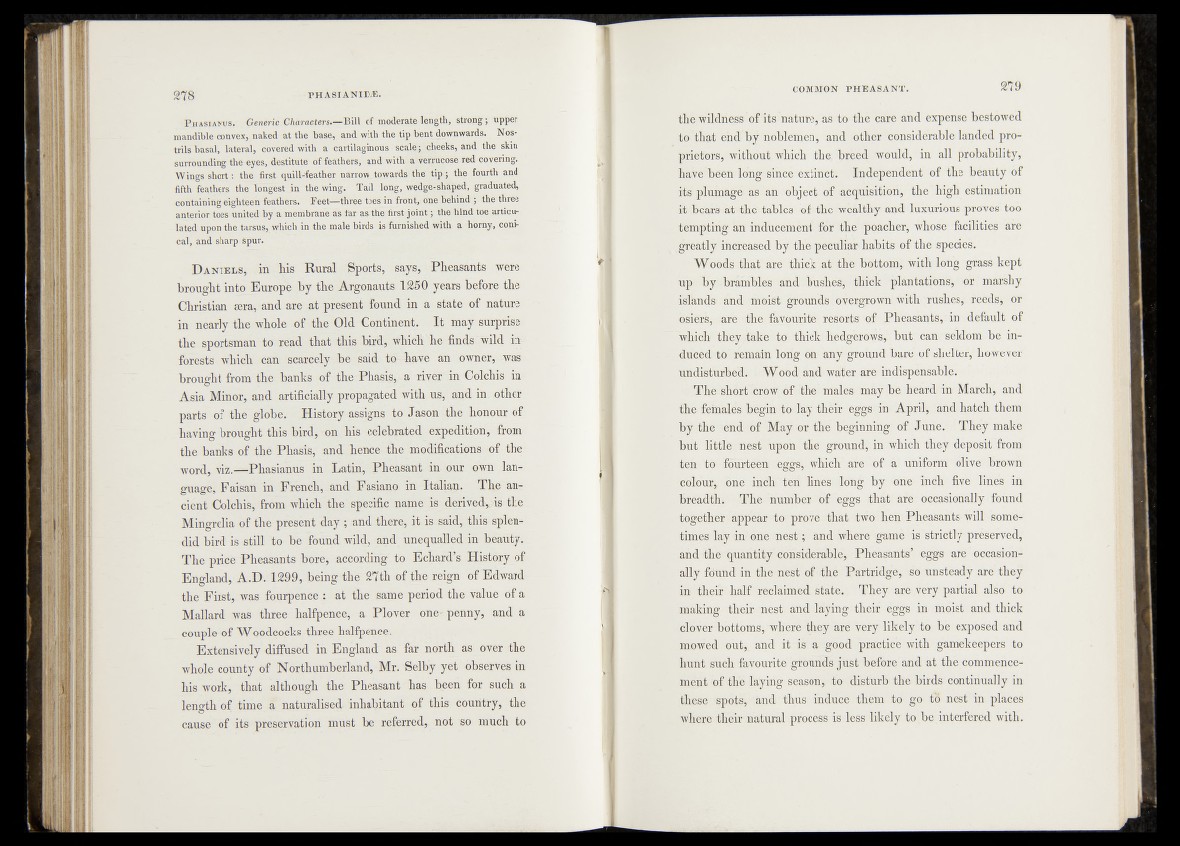
Phasianus. Generic Characters.—Bill of moderate-length, strong; upper
mandible convex, naked at the base, and with the tip bent downwards. Nostrils
basal, lateral, covered with a cartilaginous scah|}; ^cheeks, and the skin
surrounding the eyes, destitute of feathers, and with a verrucose red covering.
Wings short: the first quill-feather narrow.towards the tip; the fourth and
fifth feathers theTongest in the wing. Tail long, wedge-shaped, graduated,
containing eighteen feathers. Feet—three toesin front,- one behind ; the three
anterior toes united by a membrane as far as the first joint; the hind toe articulated
upon the tarsus,, which in the male birds is furnished with a horny, comical,
and sharp Spur.
D a n ie l s , in his Rural Sports, says, Pheasants were
brought into Europe by the Argonauts 1250 years before the
Christian sera, and are at present found in a state of nature
in nearly the whole of the Old Continent. I t may surprise
the sportsman to read that this bird, which he finds wild in
forests which can scarcely ;be said to have an owner, -was
brought from the banks of the Phasis, a river- in Colchis in
Asia Minor, and artificially propagated with us, and in, .other
parts of the globe. - History assigns to Jason the honour of
having brought this bird, on his celebrated expedition^ from
the banks of the Phasis, and hence the modifications of the
word, viz.— Phasianus in Latin, Pheasant in .our own language,
Faisan in French, and Fasiano in Italiap. The ancient
Colchis, from which the'specific n ame^derived^is the
Mingrelia of the present day ; and there, it is said, this Spfen-
did bird is still to be found wild, and unequalled'in beauty;
The price Pheasants ^febre^ according to Echard’s Histdry of
England, A.D. 1299, being the 27th ortho reign of Edward
the First, was fourpence : at the same period the value of a
Mallard was three halfpence, a Plover one* penny, and a
! couple of Woodcocks three hallpenee.
Extensively diffused in England as far north as over the
whole county of Northumberland, Mr. Selby yet obseFVeS in
his work, that although the Pheasant has been for such a
lengthof tim e a naturalise ^inhabitant of this country, the
cause of its preservation mui^he^ referred, not so much to
the wildriessbf'ifs nature, as to'the care and expense bestowed
to that ehdHby noblemen^ and other' considerable landed proprietors,
without which: th^ breed- would, in all probability,
haveheëfi Idn^^ihcSt'éèpict: Independent of the beauty of
i l l plumage as an robj J|jjg of acquisition, the high estimation
it bears 'àt^theîîtabl'ës^bf :ftkétwealthy and luxurious proves too
tempting kn inducement* for ‘hhe '-poacher, whole facilities are
Jfeatly incr-eased'^We peculiar-habits* efi the species.
Woods that 'aire thick at pF-ïâ^ttom, with long grass kept
up';by ^brambles and îfefhlsÿ"thick plantations, of marshy
islands and moist ground’llbyfergroWn with rushes,* -feeds;- or
osiers, -rare ifhe- favourite- re&orts-'Of - Pheasants,: in - default of
which theÿ^akeït^ithdék( h^dgbiçh^yibut^ca^^iltiom be induced
ftb reinain long on any^^ound bkie^O^ shelter, however'
undisturbed.’ î Woedf-ànd waller are indispensable.
The short%JowlSf the màles^mây jbefheardc in MafChl, and
fhë|(ëîïïa?ï^s begin to^lny-thei-c-cggs« ,in April, *! and ;hatchthem-
^4hé".*5êÎBd 'ôlFMaÿïkflt the b k ^ i i n n ^ c ^ '3 ^ ^ They- make
Ppt; little - nes|||bfk)ri ’tHë^rO-und, inpphich they depoifi#from
ten- to.vf^rtéeà^eggs^-Vfifh^ifêÆb^f 'a unIfôM#1É|y^prpwh
jcoMu^oene’îinch teff IlnéS'-Jdng by -one inch five linest in
bréadih*. The nunfber, .'of :eggs .that are oceasionlllytfOUnd
appear |p | prové.»t}iat 4wo'“beh- Pheasants - will some-
timess%|y in one fcestf; - and 'iwhire^gâmê * -is strict! ^preserved,'
and the tÿaahtihy considerably Pheasant^ eggs are occasionally
fdtmd in tM i l s t of -ffié Partric(|^^p!bistead^ sctéf th |j |
|ilr'the®'half^-^]'aimdd4s^fe4' They nre ;ffly partial alst)Tto
making ^th$^n^pândi'l£Èying their 8jBp$ in .moist and thick
fCl'0Ver'bhttoms;’wheM€fh^|ire«veny< likelyT-to;.!be expbsed and
mowedcput^ 'and itdSt Sfg&fh-pr^ctich^with gamekeepers to
hunt such favourite groudSS jusifb$fthj^ and at the commence^
mijffc ‘of the Ikying seasls^lo'-' disturb, thfeibirds continually in
th è se ‘spots-, 'andr thtuk* ihduèéliÉJëm.‘ to go to- nest in places
where their natural ^process isdefflf likelyf $$|be^ interfered with.